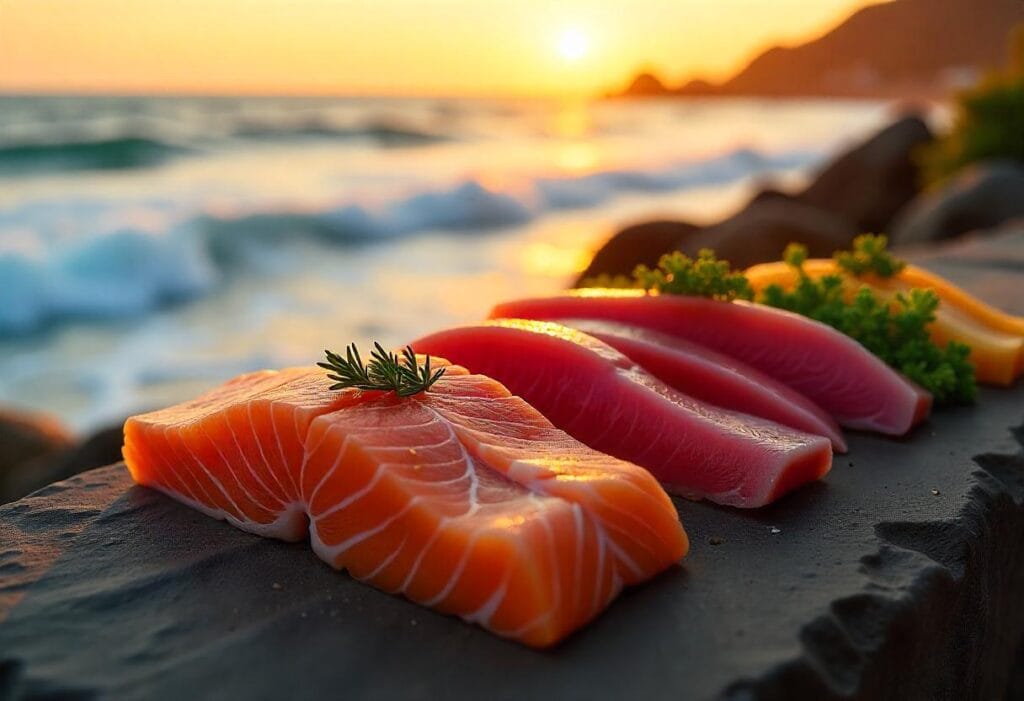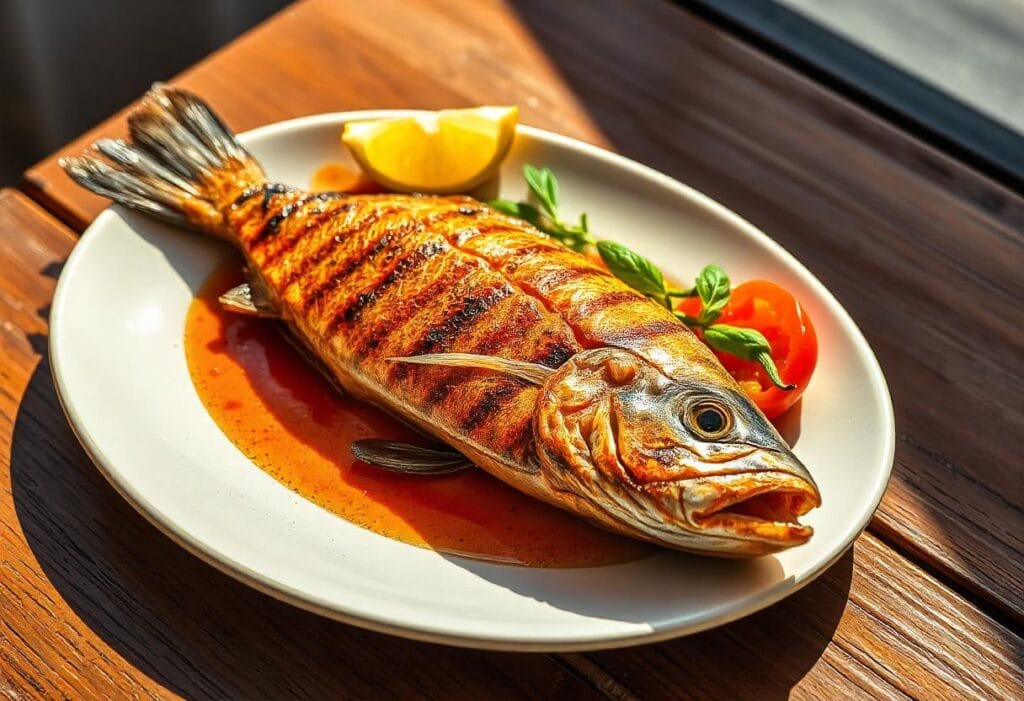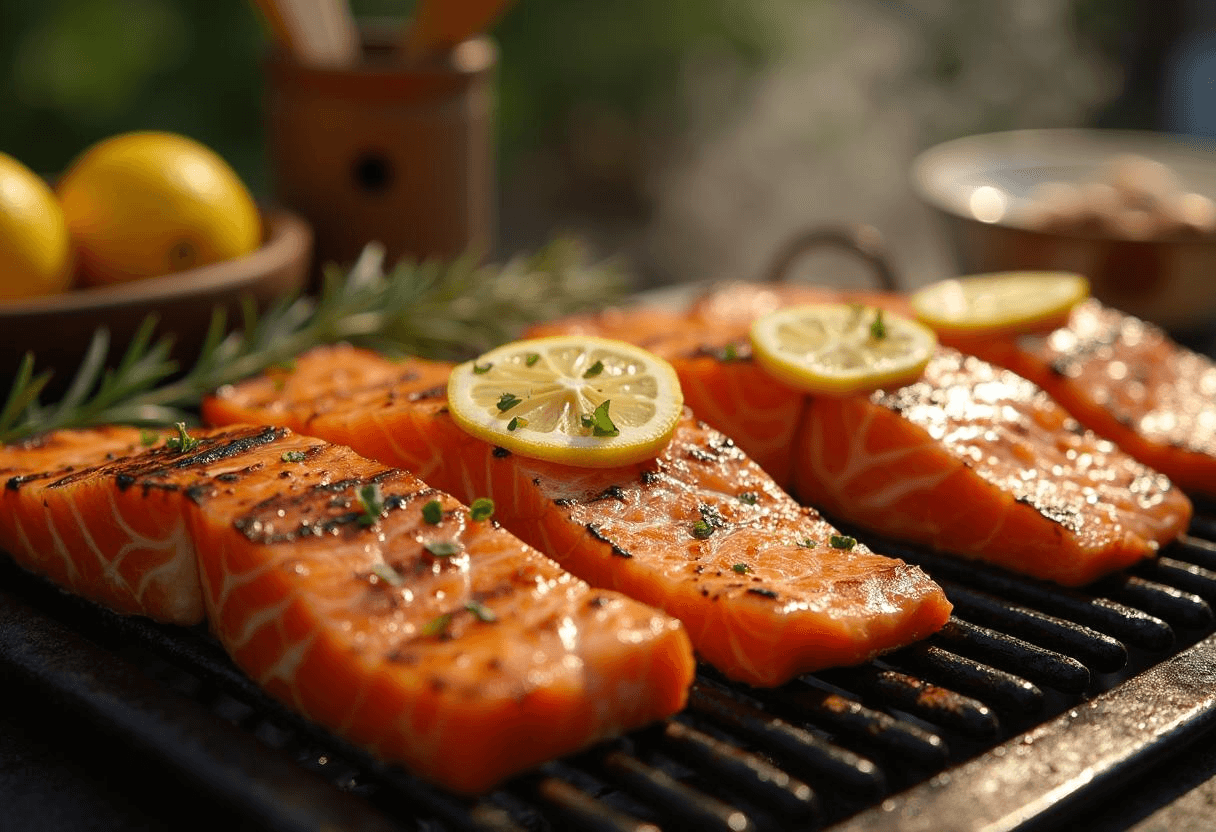Table of Contents
Grilling fish is one of the best ways to enhance its natural flavors. It adds a smoky aroma and crispy texture that makes every bite irresistible. If you’re wondering Which Fish is Best for Grilling?, check out our guide for top recommendations.
Introduction to Grilling Fish
If you’ve ever sunk your teeth into a perfectly grilled fish, you know it’s a dish that can’t be beat. The smoky char from the grill, the tender, flaky texture of the fish, and the rich flavors that come through are just a few reasons why grilling fish is so popular. But how do you ensure you’re grilling fish the right way? Is it just about throwing it on the grill, or is there more to it?
Grilling fish is one of those cooking methods that, when done properly, brings out the best in this delicate protein. The natural juices, flavors, and textures of fish are highlighted when grilled, and the addition of a good marinade or seasoning can turn an ordinary piece of fish into something extraordinary. 🍣
Why Grilling is the Best Way to Cook Fish on the Grill
Grilling is one of the oldest cooking techniques, and it remains as popular today as ever. Why? Because it’s fast, flavorful, and gives the fish a deliciously smoky, crispy exterior. Fish cooked on the grill has a unique appeal that’s hard to replicate with other cooking methods. Many home cooks search for the best way to cook fish on the grill because grilling enhances the natural flavors while adding a delicious smoky touch. The high heat of the grill helps seal in moisture while also creating that irresistible char, which adds an extra layer of flavor to the fish. So whether you’re cooking a simple weeknight meal or hosting a summer BBQ, grilling is always a great choice.
The Benefits of Grilling Fish Compared to Other Cooking Methods
When it comes to cooking fish, grilling offers several benefits over other methods like frying or baking:
- Healthier Option: Grilling doesn’t require a lot of added fat, so the fish remains light and healthy.
- Enhanced Flavor: The smoky aroma from the grill enhances the natural flavors of the fish, making each bite more flavorful.
- Quick Cooking: Fish grills faster than most meats, so you can have dinner on the table in no time.
Now that you know why grilling is such a great choice, let’s move on to choosing the right fish.
Choosing the Best Fish for the Grill: What Works Best?
Not all fish are great for grilling—some hold up better than others. To find the best way to cook fish on the grill, start by selecting firm fish like salmon, tuna, or swordfish that can withstand high heat without falling apart. If you’re looking for a detailed recipe, explore our Grilled Dorado Fish Recipes for a delicious and healthy option
What Fish Works Best for the Grill?
When it comes to grilling fish, look for species with firm, meaty flesh that can withstand the heat of the grill without falling apart. Some great options include:
- Salmon: A popular choice for grilling because of its rich, fatty flesh that stays moist and flavorful when cooked.
- Tuna: Thick and meaty, tuna steaks are perfect for grilling. They can handle high heat without losing their structure.
- Swordfish: Known for its dense, steak-like texture, swordfish holds up well on the grill.
- Mahi-Mahi: This fish has a firm texture and a slightly sweet flavor that makes it ideal for grilling.
- Snapper: A slightly delicate fish that is great for grilling whole, snapper has a mild flavor and flaky texture.

How to Choose Fresh Fish for the Grill
The fresher the fish, the better the flavor, so it’s important to know how to choose the best quality fish for grilling. Here’s what to look for:
- Clear, bright eyes: Fresh fish should have clear, bright eyes. If the eyes look cloudy or sunken, the fish may not be fresh.
- Moist, shiny skin: Fresh fish should have shiny, wet skin. If the skin is dry or dull, it’s a sign the fish isn’t fresh.
- Firm flesh: Press your finger gently on the flesh. If it bounces back, the fish is fresh. If it stays indented, it’s been sitting around for too long.
- Smell: Fresh fish should have a clean, ocean-like smell. If it smells overly “fishy,” it might not be the best choice.
Preparing Fish for the Grill
Once you’ve chosen your fish, it’s time to prepare it for the grill. Preparation is key to ensuring your fish cooks evenly and absorbs the maximum flavor from marinades and seasonings.
Cleaning and Scaling Your Fish
Before grilling, you’ll need to clean your fish properly. If you’re grilling a whole fish, the first thing you need to do is scale it. Here’s how:
- Scale the Fish: Use a fish scaler or the back of a knife to gently scrape off the scales, working from the tail to the head.
- Gut the Fish: Make a small incision along the belly and remove the internal organs. Rinse the cavity under cold water to clean it out.
- Remove the Gills: If you’re cooking a whole fish, you may want to remove the gills for a cleaner presentation.

Marinating Fish for the Grill: Tips for Maximum Flavor
Marinating fish is a great way to add flavor and keep it moist during grilling. Since fish is delicate, you’ll want to use a marinade that enhances the flavor without overpowering it.
Quick Marinade Recipe:
- 2 tablespoons olive oil
- 1 tablespoon lemon juice
- 1 teaspoon minced garlic
- 1 tablespoon fresh herbs (such as parsley or dill)
- Salt and pepper to taste
Instructions: Mix all ingredients in a bowl and coat the fish with the marinade. Allow the fish to marinate for at least 15 minutes, but no longer than 30 minutes, as fish can easily absorb too much flavor. The marinade helps enhance the natural taste of the fish without overwhelming it.
Seasoning Your Fish: How to Enhance Natural Flavors
Seasoning is another crucial step in preparing fish for the grill. Fish has a mild flavor, so the seasoning should complement and enhance its natural taste without masking it. Here are a few seasoning ideas:
- Lemon and herbs: Classic and simple, a bit of lemon zest and fresh herbs like thyme or rosemary can elevate the flavor.
- Garlic and butter: For a richer taste, a combination of garlic and butter works wonders.
- Spices: A sprinkle of paprika or chili powder adds depth and a bit of heat, perfect for those who like their fish with a kick.
The Best Techniques for Grilling Fish
Grilling fish might seem simple, but there are a few techniques you can use to make sure it turns out perfectly every time. From managing grill temperature to using the right tools, these tips will help you master the art of grilling fish. 🐟
Direct vs. Indirect Grilling: Which One to Use?
Both direct and indirect grilling have their advantages depending on the type of fish you’re cooking, the best way to cook fish on the grill depends on whether you’re cooking thick fish steaks or delicate fillets that require lower, indirect heat. Learn more about The Best Method for Cooking Trout and how to get the perfect texture
- Direct Grilling: This method is best for thin fillets or steaks. You place the fish directly over the flames, and the heat cooks the fish quickly, giving it that crispy, charred exterior. Most types of fish like tuna, salmon, or mahi-mahi work well with direct grilling.
- Indirect Grilling: For thicker cuts of fish or whole fish, indirect grilling is the way to go. In this method, the fish is placed off to the side of the grill, allowing it to cook through more gently. This is perfect for larger fish like swordfish or snapper. It prevents burning the outside while ensuring the fish is cooked all the way through.
Pro Tip: Always preheat your grill to the appropriate temperature before starting, whether you’re using direct or indirect heat.

How to Prevent Fish from Sticking to the Grill
One of the biggest challenges when grilling fish is preventing it from sticking to the grates. To ensure the best way to cook fish on the grill, always oil both the grates and the fish before cooking to create a non-stick barrier.. There’s nothing worse than trying to flip a fish fillet and having it fall apart or stick to the grill.
Here’s how to prevent fish from sticking:
- Oil the Grill: Before placing the fish on the grill, oil the grates. You can use a paper towel dipped in vegetable or canola oil to wipe down the grill. This creates a non-stick surface and helps prevent your fish from sticking.
- Oil the Fish: Lightly brush the fish with olive oil or cooking spray. This helps create a protective layer that prevents it from sticking and also enhances flavor.
- Use a Fish Basket or Grill Mat: If you’re cooking delicate fish like fillets, a fish basket or a grill mat can make flipping the fish much easier and prevent it from breaking apart.
Using Fish Baskets and Grilling Mats for Easy Cooking
If you’re grilling delicate fish like trout or fillets that may fall apart, consider using a fish basket or grill mat. These tools make grilling easier, preventing the fish from slipping through the grates or getting stuck.
- Fish Basket: A fish basket allows you to grill fish whole or in fillets without worrying about flipping them or the fish falling apart. Simply place your fish in the basket and close it, and you can easily flip the entire basket on the grill.
- Grill Mats: These mats are non-stick and can be placed directly on the grill grates. They provide an even cooking surface and prevent your fish from sticking or falling through.
Common Problems and Solutions When Grilling Fish
Grilling fish is a fun and rewarding experience, but it can come with some challenges. Whether you’re a beginner or a pro, here are a few common problems you might encounter when grilling fish, along with solutions to fix them.
Fish Falling Apart on the Grill: How to Fix It
One of the most common problems when grilling fish is that it falls apart or gets stuck to the grill. This is especially true for delicate fish like sole or flounder.
Solution:
- Use the Right Fish: Firm-fleshed fish like tuna, swordfish, and salmon are less likely to fall apart.
- Preheat Your Grill: Make sure your grill is preheated to the proper temperature, around 375°F to 450°F (190°C to 232°C), so the fish cooks quickly and doesn’t stick.
- Use a Fish Basket or Grill Mat: These tools help keep the fish intact and make flipping it much easier.
Overcooking Fish: How to Keep It Moist and Tender
Overcooking fish is a common mistake, especially when grilling. Fish cooks quickly, and if you leave it on the grill too long, it can become dry and tough.
Solution:
- Monitor the Cooking Time: Keep an eye on the fish and use a meat thermometer to ensure it reaches an internal temperature of 145°F (63°C). Fish should be opaque and flake easily with a fork when done.
- Don’t Overcook: Fish cooks fast, so be sure to check it frequently, especially if you’re grilling fillets. Whole fish may take a little longer, but be careful not to leave it on the grill too long.
Achieving the Perfect Grill Marks on Fish
Achieving those beautiful, crispy grill marks can be tricky, but it’s totally possible with a little practice. Grill marks add a lot of flavor and texture to your fish, making it look and taste even better.
Solution:
- Oil the Grates: Ensure that the grill grates are well-oiled to prevent sticking. This is key to achieving perfect grill marks.
- Preheat the Grill: Make sure the grill is hot before you place the fish on it. A hot grill will help create those grill marks and a crisp exterior.
- Don’t Move the Fish Too Early: Let the fish cook undisturbed for a few minutes before attempting to flip it. This will ensure the fish develops grill marks and doesn’t stick to the grates.
Grilling Fish at the Right Temperature
Temperature control is essential for grilling fish properly. If you’re looking for the best way to cook fish on the grill, maintaining the right heat level ensures the fish stays moist and flavorful.
How to Preheat the Grill for Optimal Cooking
Before you start grilling, make sure your grill is properly preheated. If you’re using a charcoal grill, give it 20-30 minutes to heat up. If you’re using a gas grill, preheat it for about 10-15 minutes. This ensures that the fish cooks evenly and that you get the best flavor and texture.
Pro Tip: If you’re using a gas grill, set it to medium-high heat. For charcoal, you’ll know it’s ready when the coals are glowing red and ashy.
The Best Grill Temperature for Different Types of Fish
Different types of fish require slightly different grilling temperatures. Here’s a quick guide:
- Delicate Fish (like flounder, sole, or snapper): Grill over medium heat (350°F to 375°F). These fish cook quickly and can dry out if the heat is too high.
- Medium-Firm Fish (like salmon, trout, or mahi-mahi): Grill over medium-high heat (375°F to 400°F) for about 4-6 minutes per side.
- Firm Fish (like tuna, swordfish, or shark): These fish can handle higher temperatures (400°F to 450°F). Grill for 4-6 minutes per side, depending on thickness.
Grilling fish at the right temperature ensures a crispy exterior while keeping the interior tender and juicy. 🐟🔥
Grilling Fish Whole vs. Fillets: What’s the Difference?
Some people prefer grilling fish whole, while others like to go with fillets. Both options have their advantages, but what’s the best choice for your meal? If you’re grilling whole fish, check out How to Serve Dorado for tips on preparation and presentation
Advantages of Grilling Whole Fish
Grilling fish whole gives you a beautiful presentation, and it can be easier to cook. The skin acts as a protective barrier, keeping the fish moist and preventing it from falling apart.
- Flavor: Grilling whole fish locks in the flavor and moisture.
- Presentation: A whole fish on the grill is visually stunning and makes for an impressive centerpiece.
- Moisture: The skin helps retain moisture, ensuring that the fish stays tender.
Why Filleting Fish Might Be a Better Option
Filleting fish is great for those who prefer a cleaner eating experience. It also cooks faster since the fish is already separated into portions.
- Ease of Eating: Fillets are easier to serve and eat.
- Faster Cooking: Fillets cook more quickly and are easier to manage on the grill.
- Customization: Fillets allow you to add different seasonings or sauces to each portion.
Frequently Asked Questions (FAQ)
Here are some of the most common questions people have when grilling fish, along with their solutions. Whether you’re new to grilling or an experienced cook, these answers will help you get the most out of your grilling experience.
1. How long should I grill fish for?
The cooking time depends on the thickness of the fish. As a general rule, grill fish for 4-6 minutes per side. For fillets, check for an internal temperature of 145°F (63°C) or until the flesh is opaque and flakes easily with a fork. Whole fish may take a little longer, around 10-12 minutes, depending on size.
2. Can I grill frozen fish?
Yes, you can grill frozen fish, but it’s better to thaw it first for even cooking. If you must grill from frozen, ensure the fish is fully thawed before placing it on the grill, and increase the cooking time slightly.
3. What should I do if my fish sticks to the grill?
To prevent fish from sticking, make sure to oil both the fish and the grill grates. You can also use a fish basket or grill mat to make flipping the fish easier and prevent it from falling apart.
4. What type of fish is best for grilling?
The best fish for grilling are those with firm, meaty flesh that can hold up to the heat, such as salmon, tuna, swordfish, and mahi-mahi. These types of fish are great because they don’t fall apart on the grill and have excellent flavor.
5. Should I use direct or indirect heat for grilling fish?
For delicate fish fillets, direct heat works best, as it gives a nice sear without overcooking. For thicker fish steaks or whole fish, indirect grilling is ideal to ensure the fish cooks through without burning.
6. Can I use marinades on fish?
Yes! Marinating fish adds flavor and helps keep it moist. However, don’t marinate for too long—15 to 30 minutes is ideal. Fish is delicate, and marinating too long can cause it to break down.
7. How can I tell if my fish is cooked properly?
Fish is perfectly cooked when it reaches an internal temperature of 145°F (63°C). The flesh should be opaque and should easily flake with a fork. If the fish doesn’t flake easily, it needs a little more time on the grill.
Conclusion: Mastering the Art of Grilling Fish
Grilling fish is a simple yet rewarding cooking method that brings out the best flavors in this delicate protein. If you follow these steps, you’ll master the best way to cook fish on the grill, ensuring a perfectly tender, flavorful, and crispy result every time. By following the tips and techniques in this guide, you’ll be able to grill fish like a pro every time. Whether you’re grilling firm fish like tuna or delicate fillets like snapper, the right preparation and grilling techniques will ensure your fish turns out perfectly cooked—moist, flaky, and full of flavor.
From choosing the right fish to using the right grilling techniques, temperature, and tools, every step matters in creating the perfect grilled fish. And don’t forget about the sides and sauces! The right accompaniments can elevate the entire meal and complement the fish’s smoky, charred flavor.
Whether you’re cooking for a family BBQ or preparing a special dinner, grilling fish is a versatile, healthy, and delicious option that is sure to impress. With a little practice and a few key tips, you’ll soon master the art of grilling fish, making it a staple in your culinary repertoire. So fire up that grill and start cooking—delicious grilled fish awaits! 🍽️🔥

